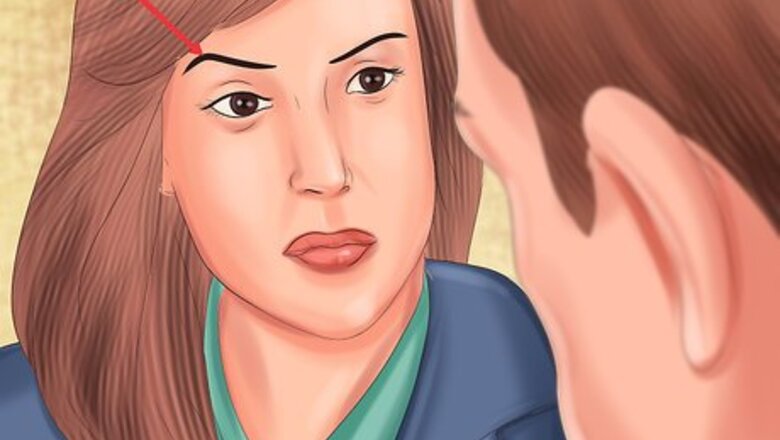
views
X
Trustworthy Source
Harvard Business Review
Online and print journal covering topics related to business management practices
Go to source
Being Approachable

Have inviting body language. Inviting body language means positioning yourself in a way that makes it inviting and easier for people to come talk to you. This means facing the person who is speaking to you and standing with an open posture with your arms at your side for example, rather than crossing your arms in front of your chest. Crossing your arms in from of your chest might imply that you don't want to have a conversation. Or, if you are in the middle of a conversation and you keep yawning and looking around as someone is talking to you, they might assume that you aren't listening and don't care what they have to say. Conversely, to show that are listening and do care what they have to say, here are some engaging body language cues you can try: Raising your eyebrows every once in while. Moving slightly closer toward the person speaking to you. Smiling and laughing when it is appropriate. Tilting your head when hearing new or interesting information. Nodding your head if you agree or understand what someone is saying.

Keep eye contact. In Western culture, making eye contact is a non-verbal way of letting someone know that they have your attention and respect -- two important factors involved in having a productive conversation. Making and keeping eye contact lets the other person know that they can proceed with what they want to say, knowing that you are ready to listen.

Listen without distraction. An important part of listening is being able to zone out background noise, thoughts, and conversations so you focus on the conversation in front of you. Being distracted by other things takes your attention away from the speaker and lessen your ability to fully listen. Turning off communication devices like cell phones is a polite and easy way to get rid of further distractions. However, while it’s definitely a good idea to give someone your full attention while they’re speaking, other cues like making eye contact and asking questions may be more helpful. Reader Poll: We asked 219 wikiHow readers and only 9% of them agreed that the best way to show someone that you’re actively listening is by avoiding distractions. [Take Poll]
Listening Actively

Take note of the speaker's body language. Someone's body language can communicate a lot more than the actual words they are saying. For example, if your partner keeps looking down at the floor, that might be an indication that they are shy, embarrassed, or sad. Since words only convey a fraction of the message, "listening" to body language cues can help you further understand what the speaker is trying to communicate besides what their words convey.

Listen with the intent to learn. Some people focus on how they are going to reply when someone is talking to them, rather than absorbing and understanding what their partner is trying to communicate. That isn't a habit of someone who is a good listener. Instead of thinking of your response, try to fully absorb what your partner is trying to say to you, and view every conversation you have as a learning opportunity. You might not be knowledgeable or fascinated with every topic of discussion, but listening with the intent to learn offers other points of view different from your own, and a chance for you to grow as a listener.

Be open minded. A basic rule of listening, is to judge only after you've heard and evaluated what someone has to say. You must wait to form your opinions, because once you deem someone to be ignorant, ill-informed, or shallow, you immediately shut them out and stop listening to what they have to say. You might disagree with someone, but you will never find out until you listen to their ideas and opinions. Be open to the idea that your scope of seeing things may not be the only, or necessarily the best way of seeing the world.

Try to empathize. Empathizing is trying to feel yourself, what the speaker is feeling at that moment. Identifying with the speaker in this way allows for better understanding of what they are trying to communicate, and where their feelings are coming from. You don't always have to agree with what they say, but by empathizing with them, you listen to their point of view and you might be better suited to assess what they are trying to express. To empathize, you might try to reiterate in a simple way what they have told you, and voice your interpretation of how they seem to be feeling. For example, after someone has told you about a fight they had with their sister, you might empathize and say something like, "I get the sense that you are really angry about what was said, and I can see how her calling you those names would make you feel hurt at the same time."

Avoid trying to offer an immediate solution. Sometimes, when people explain a problem they are experiencing, it might feel instinctual to offer a solution to their problem. Instead, just listen what they have to say. Most people ask for advice when they want it. Also, someone might simply be trying to talk through a problem to figure out how to solve it themselves, rather than asking you to figure out the answer for them. If someone seems to be really struggling to figure out what to do, and you have a suggestion that you think might genuinely help them, you should at least get the speaker's permission and ask something like, "I might have an idea about how you can handle that. Do you want to hear it?"

Remember to use an active-listening attitude. Using an active-listening attitude can help reinforce positive listening practices and encourage respectful listening tendencies. Exercising an active-listening attitude means: Acknowledging that listening is just as important speaking in a conversation. Hearing what somebody has to say is equally important as voicing your opinion to them. Being aware that listening is necessary for productive exchanges of information. Those who remember to prioritize listening create less confusion in a conversation, cause fewer misunderstandings, and misspeak less frequently. Understanding that listening to others is not only necessary, but all around beneficial for the betterment of the conversation. Always try to absorb some piece of new information when you encounter and interact with new people.
Responding Appropriately

Use top-down listening strategies to prepare your response. Using a top down strategy means you, as a listener, calling on information you already know (about the subject you and your partner are discussing, your partner, the context of your conversation, and the specific language being used to create the conversation), in order to plan what you will say next. Using this kind of strategy allows you, as a listener, to process what you have already heard, and gauge where the conversation is headed. For example, you can show that you've been paying attention by explaining and giving a short summary of how you yourself understand the situation the speaker is explaining. Some other components of this strategy involve: Anticipating. Paraphrasing. Differentiating fact from opinion. Interpreting tone.

Use bottom-up listening strategies to gather further information and prepare a response. Using a bottom-up strategy means using specific lingual signifiers to draw meaning from what the speaker you're listening to is saying. These signifiers include the actual language the speaker uses to express themselves, the grammar used to create their message, and the sounds used to create the message. Some other components of this strategy include: Picking out individual words. Noting words of similar origin. Identifying placement patterns of words. "Identifying prefixes, roots, and suffixes".

Don't interrupt. Interrupting someone while they are speaking is the exact opposite of listening to what they have to say, and it sends a lot of bad messages like: “What I have to say is more interesting and meaningful than what you have to say.” “You and your opinion is less important than me and my opinion.” “I don’t have time to hear how you think or feel.” “What you have to say isn't worth listening to.” “I'm going to do whatever I can so I get to speak, regardless if you get your turn.”

Ask questions during an appropriate pause. Rather than interrupting the speaker to ask a question, wait for a natural break, and then ask your question. It engages the speaker to hear your thoughts and areas of confusion, shows that your interested enough to want clarification, and it follows the natural pattern of a back and forth conversation, rather than someone merely talking at you. Sometimes, the speaker mentions something that relates to ourselves, and we ask a question that leads the speaker to go off on a tangent. When you notice that you inadvertently caused your conversation partner to stray away from your original topic of conversation, get the conversation back on topic by saying something like, “I love hearing about your dog, but I want to hear more about what you were saying earlier with Kate starting high school. How is she liking it so far?”

Give the speaker consistent reactions to show you're attentive. You want to insert phrases or snippets of feedback that show that you are reflective on what the speaker is saying. You could do things like: Show your comprehension of what they're saying by using expressive reactions like an understanding head nod, or looking concerned if the speaker says something alarming. , or asking questions if they talk about a new development in their lives. Provide verbal cues of encouragement to the speaker as they talk such as asking further questions, or saying something like, "Wow that's so interesting. Tell me all about it."

Follow up. After some time has passed from your original conversation, it might be beneficial to send a text, email, or call and see if there have been any developments from the last time you spoke. This does not apply to all cases of conversations, but this added effort shows that you were listening intently to your original conversation, and cared enough to check in.




















Comments
0 comment